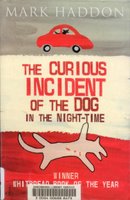 By Mark Haddon
By Mark HaddonI have avoided reading this book for ages, because the title annoyed me. How pretentious, I thought. Hear ye, hear ye: ye shall not judge a book by its title. (Unless it be The Horse Whisperer). This book was GREAT. Apparently it is really a book for “Young Adults” but has not been any less popular amongst adult readers. This book is another example in my ever-growing pile of evidence that some of the best books ever written are those written for “Young Adults”. Incidentally, imagine how you would feel if you were old enough to have relations with a woman, and yet – you could not drink in pubs. Sorry, where am I? Channelling “The Young Ones”, evidently.
This book is narrated by Christopher, who we soon discern is a fairly unusual teenager – for example, he is a maths genius, but hates the colours brown and yellow. He can’t eat food on his plate if different foods are touching each other. He doesn’t really like people much. He screams and rocks if he is afraid or confused. It is never said, but we assume Christopher is autistic. About a year and a half ago Christopher’s mother died, and now his father looks after him on his own. At the start of this story, Christopher is on one of his late-night walks when he discovers a neighbour’s dog (Wellington) dead in the neighbour’s front yard. Wellington has obviously been murdered, because he has a garden pitchfork sticking out of him, and Christopher resolves to find out who did it, in his own unique way, and despite his father’s instructions not to play detective.
As I’ve written elsewhere (in another review), I’m always a bit suspicious of authors writing from the perspective of someone who is very much unlike themselves. (Must check whether Mark Haddon is autistic himself; presumably he must at least have close contact with someone who is). How can I check whether Haddon’s representation of Christopher’s view of the world, his thinking patterns and is logic, is authentic? Well I can’t. But this book was a fascinating glimpse into what it may be like to be autistic (i.e. it successfully fooled me), and into the damage an autistic child can unwittingly wreak on his parents’ relationships - also, how easy it can be for an autistic person to fall afoul of the police and other people who do not recognise the cause of his unusual behaviour.
Rating: 8 out of 10
No comments:
Post a Comment